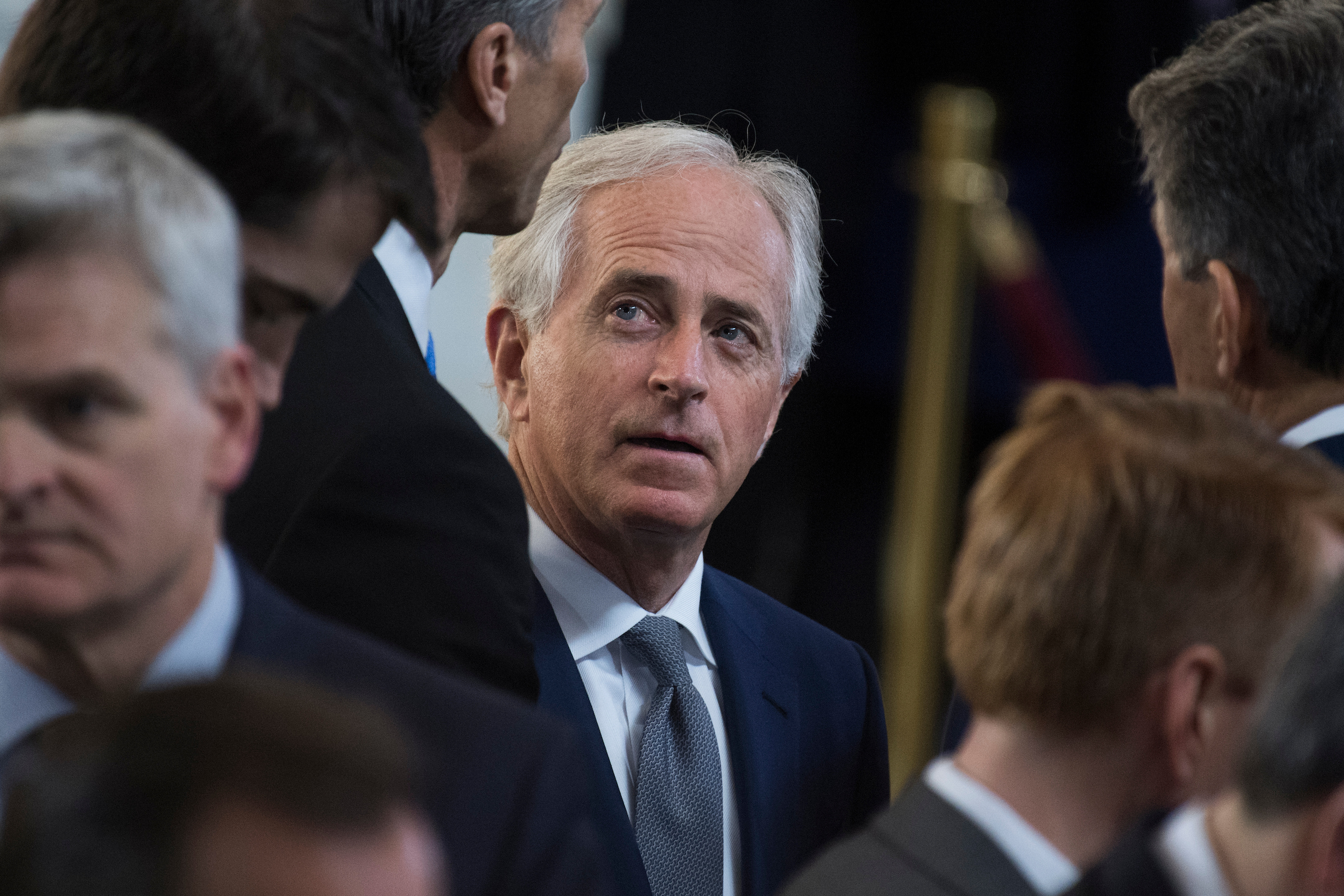Corker Releases AUMF Without an Expiration Date
Prospects for approval uncertain with expected opposition within Foreign Relations panel

The long-awaited draft authorization to set new guidelines on the 17-year-old war on terrorism was released Monday night by senators and, to the displeasure of some Democrats, it would not impose significant restrictions on military operations, such as an expiration date.
The bipartisan Authorization for Use of Military Force of 2018 would repeal and replace the 2001 AUMF, which has been increasingly criticized for its expansive justification of all kinds of military actions against extremist groups that did not exist at the time of the 9/11 attacks. The new AUMF would also repeal the 2002 authorization that enabled the 2003 Iraq War.
Senate Foreign Relations Chairman Bob Corker, the resolution’s principal sponsor, told reporters a markup is planned as early as next Monday, but that he has offered committee members the chance to have a separate closed meeting beforehand where they can go through the text line by line.
The Tennessee Republican said he is not focused on the lack of commitment from GOP leadership to schedule a floor vote if the measure is advanced out of committee.
Watch: What’s the Status on the Bill to Protect Mueller?
“My first goal is to move something out of committee, so I don’t really worry about much beyond having a successful vote in the committee, which has been difficult for years,” Corker said.
The new AUMF is co-sponsored by Democrats Tim Kaine of Virginia, Chris Coons of Delaware and Bill Nelson of Florida, and Republicans Jeff Flake of Arizona and Todd Young of Indiana.
Even in committee, the prospects for approval are uncertain, with at least one Republican, Rand Paul of Kentucky, criticizing any measure that does not dramatically constrain counterterrorism operations in the Middle East and elsewhere. And several Democrats are also likely to oppose the compromise measure, given its lack of a hard sunset provision.
Corker said prospects for a Senate floor vote likely hinge on securing committee passage of his resolution by a wide margin. “What matters on things like this is if they pass with a degree of support,” said the chairman, who is retiring at the end of the year. “If it’s a nail-biter … they [Republican leaders] think it’s not something that’s really successful; there’s less reason to bring it up.”
‘Designated associate forces’
The 20-page authorization would explicitly permit continued operations against al-Qaida, the Taliban, the Islamic State and “designated associate forces.” The resolution does not, however, authorize attacks against nation-states, so it could not, for instance, be used as congressional permission if the Trump administration conducts another airstrike against Syrian President Bashar Assad’s government.
Foreign Relations ranking member Robert Menendez said the lack of sunsets in the resolution was a problem for him. The senior New Jersey Democrat also said he had concerns about whether the resolution essentially “changes the nature of Congress declaring war, which is what the Constitution says, versus nullifying it after something happens, which I understand was part of their language.”
Corker’s AUMF would not automatically lapse on a date certain, as many liberals and Democrats have urged. However, his draft includes a process for lawmakers every four years to review the authorization and, under expedited procedures, vote to repeal or modify the AUMF. But that puts the impetus of action on Congress — a high-bar for even mundane legislative matters — and any AUMF-related vote would have to clear a 60-vote hurdle in the Senate.
Sen. Benjamin L. Cardin of Maryland, a Foreign Relations member who until recently served as its top Democrat, said it would be “very difficult” for the new authorization, which he is not supporting in its current form, to pass Congress “without an effective sunset.” He also said it would need options for easily adjusting its uses, similar to how consecutive presidents have adjusted the 2001 AUMF to respond to the evolving terrorism threats.
The new text offers some transparency improvements over the 2001 authorization including a requirement for the president to notify Congress within 48 hours if and when military operations are expanded into countries beyond Afghanistan, Iraq, Syria, Somalia, Yemen and Libya, or against “new designated associated forces.” Any such enlargement of military operations would kick off a two-month review period by Congress during which legislation to block the expanded strikes would qualify for expedited consideration.
The resolution covers as “existing associated forces” the Yemen-based al-Qaida in the Arabian Peninsula, the East African terrorist group al-Shabab, the Syria-based Nusra Front, the Haqqani network in Afghanistan, and al-Qaida in the Islamic Mahgreb.
No restrictions on the sustained use of ground forces would be made by the new AUMF, which instead authorizes “all necessary and appropriate force.”
Democrats in previous AUMF debates have pushed for more restrictive language on the deployment of large numbers of U.S. troops, but Kaine said he, and he suspects others, have come around on the idea.
“We do not have a tactical limitation,” the Virginia Democrat said. “I’ve become convinced in talking to colleagues and others … [that] Congress is the initiator but tactical decisions should be made by the commander in chief.”
The resolution would repeal the 2001 and 2002 war authorizations four months after the measure becomes law.
Coons acknowledged the resolution was far from his ideal but said he was supporting it in order to finally pass something after 17 years of relying on the outdated authorization.
“Frankly, this is not the AUMF that I would write,” he said. “Sen. Kaine and Sen. Corker, a Democrat and Republican whom I respect and who have worked very hard on this, asked me to join them in saying, ‘It’s time for us to move this forward.’ More than anything, I joined as a co-sponsor in that spirit.”
Niels Lesniewski contributed to this report.





